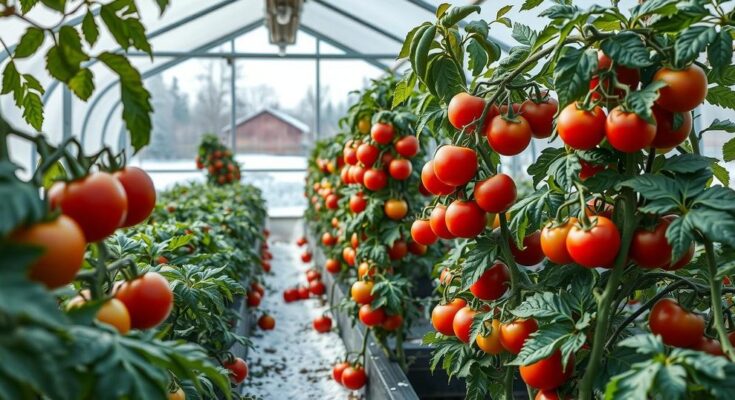The Shakh Eco Food greenhouse successfully cultivates Fujimaro tomatoes in Kazakhstan’s harsh winter through advanced technology. With an ideal climate maintained year-round, this innovative facility showcases sustainable farming practices amid extreme temperature variations. Key figures discuss various methods, including energy management, irrigation techniques, and pest control, contributing to high-quality production and efficient logistics. This breakthrough exemplifies the future of agriculture, even in the most challenging environments.
The Shakh Eco Food greenhouse in Kazakhstan showcases innovative agriculture by successfully growing Fujimaro tomatoes in extreme winter conditions. Amidst temperatures dropping to -25°C and lower, this 14-hectare facility maintains an ideal environment, allowing for continuous plant growth year-round. Key figures such as Elikram Mustafazade, Agasahib Gasimov, and consultant Dr. Rasim Mammadov discuss the transformative techniques employed to achieve this remarkable feat in one of the harshest climates on earth.
Kazakhstan, the ninth-largest country globally, presents unique challenges for agriculture due to its severe climate, with summer highs reaching +40°C and winter lows plummeting to -40°C. Despite these obstacles, the country’s rich natural resources and innovative greenhouse technologies position it as a significant player in agriculture, particularly in grain production and livestock farming.
In the Shakh Eco Food greenhouse, traditional agricultural boundaries become irrelevant. According to Elikram, “We have redefined agriculture.” The greenhouse employs advanced insulation techniques, including double-layer polycarbonate walls, which trap heat while preventing cold air infiltration. It maintains a consistent temperature of 20-25°C through smart energy management and localized heating solutions involving gas and biomass energy.
A critical aspect of successful tomato cultivation in cold climates is managing irrigation water temperature. Agasahib explains that low temperatures can stress root systems, subsequently hindering growth. To combat this, the greenhouse utilizes hot water pipes, and a boiler system provides heated water that circulates beneath plant beds, ensuring optimal conditions. This comprehensive method facilitates an ideal microclimate for thriving tomato plants.
In conjunction with temperature management, Elikram emphasizes the importance of ventilation to mitigate plant diseases, which can still occur despite cold weather. The greenhouse’s air circulation systems help prevent fungal outbreaks, while their pest management approach incorporates natural predators instead of chemical crop protection.
Fujimaro tomatoes are cultivated using advanced techniques that incorporate cocopeat as a substrate, eliminating soil-borne diseases and promoting efficient irrigation through a drip system. This method allows for precise nutrient delivery, enhancing flavor and quality. Consequently, productivity rises, reducing environmental impact.
Transportation logistics are vital for ensuring the quality of tomatoes destined for Russian markets. Post-harvest, tomatoes are packed in ventilated boxes and transported via temperature-controlled trucks to safeguard freshness. Rasim confidently asserts, “Growing tomatoes in Kazakhstan’s harsh winter was once a dream. But now, it is a reality.”
By utilizing modern greenhouse technology and scientific approaches, the Shakh Eco Food facility exemplifies the future of agriculture, demonstrating the potential for high productivity even in extreme conditions. With aspirations for agricultural advancements beyond earth, this greenhouse revolution marks a significant step in overcoming nature’s challenges.
The Shakh Eco Food greenhouse in Kazakhstan successfully addresses the challenges of winter agriculture through innovative technologies and practices. By maintaining optimal growing conditions for Fujimaro tomatoes, the facility redefines agricultural possibilities in extreme climates. This achievement not only enhances productivity but also demonstrates the viability of sustainable farming practices. The integration of science, advanced techniques, and strategic logistics paves the way for future agricultural endeavors, potentially expanding beyond earthly boundaries.
Original Source: www.hortidaily.com




